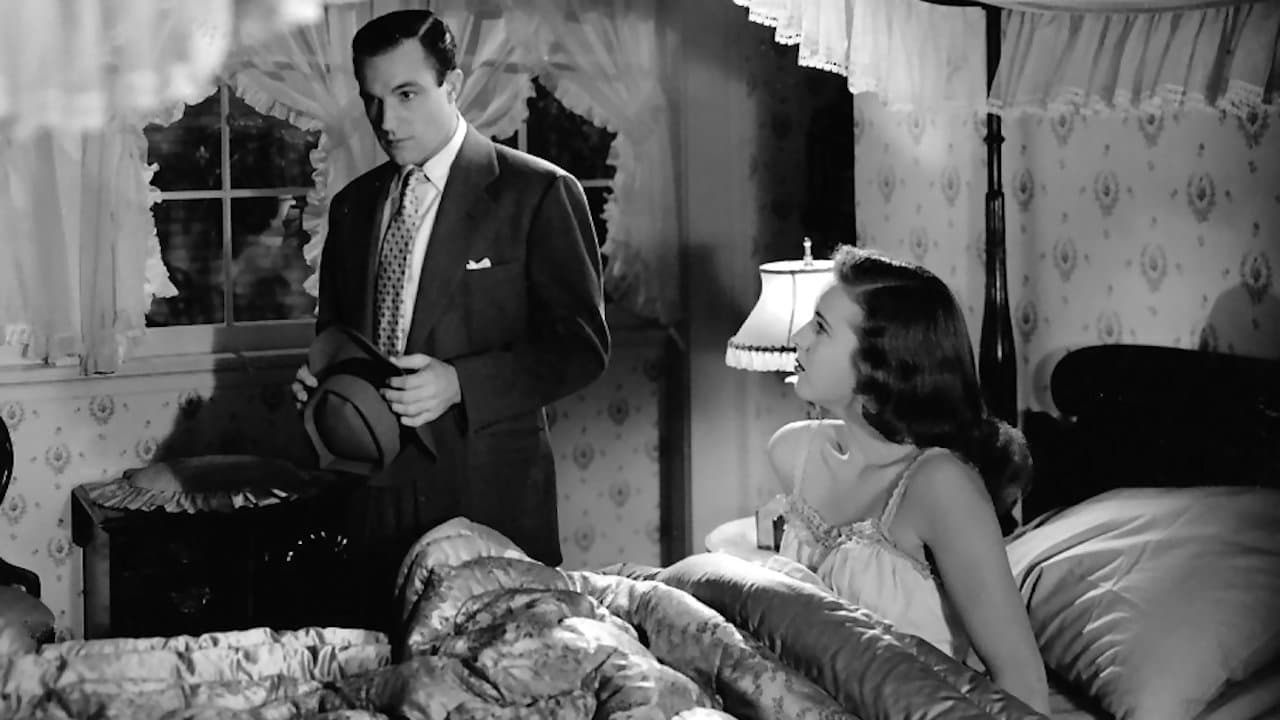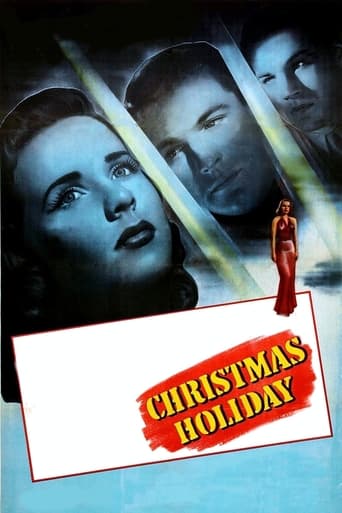

It's fun, it's light, [but] it has a hard time when its tries to get heavy.
... View MoreI like movies that are aware of what they are selling... without [any] greater aspirations than to make people laugh and that's it.
... View MoreThe thing I enjoyed most about the film is the fact that it doesn't shy away from being a super-sized-cliche;
... View MoreYes, absolutely, there is fun to be had, as well as many, many things to go boom, all amid an atmospheric urban jungle.
... View MoreThis is a strange noir, made even more so by the odd casting of the usually wholesome Deanna Durbin and Gene Kelly as a barely-disguised 'floozie' and an inveterate gambler and murderer respectively! Besides, the title is most ironic since, while it does revolve around just that occasion, the main narrative (which unfolds in flashback, a typical genre device, I might add) hardly evokes a feeling of good cheer – incidentally, this is possibly the only film set around this time of year to depict the Midnight mass traditionally held on Christmas Eve! Christmas HOLIDAY, then, was only director Siodmak's second noir: the result is somewhat pretentious for a movie from this vintage, yet this very quality has helped render it less dated than others of its ilk! I should point out that the late eminent British film critic Leslie Halliwell resented the script's approach to the source material – but, while this is unusually billed in the opening credits as "W. Somerset Maugham's Christmas HOLIDAY as written by Herman J. Mankieiwicz", the author himself was reportedly enthusiastic about the screen rendition!For the record, I own 10 vehicles by the female lead (who actually initiated the project in an effort to change her child-star image!) but, more by accident than design, this is the first I have watched – and it appears that, not only was the film her personal favorite but also, in her opinion, the only worthy one she ever did! Incidentally, she would again dabble in the thriller genre with the more modest but still interestingly-cast LADY ON A TRAIN (1945), which I do have a copy of. By the way, the actress (who retired from the screen way back in 1948!) has just turned a venerable 90 years old in December! With respect to Kelly, this was his seventh picture (having debuted just 2 years previously) and, in his case, too, he would appear in only one other title in this vein i.e. BLACK HAND (1950), which I have also acquired some time back but have yet to catch up with. As for how the two fare within this seedy/gloomy environment, Kelly is quite good as a ne'er-do-well but Durbin (even though the studio bosses forced her into a couple of numbers – Frank Loesser's "Spring Will Be A Little Late This Year" and Irving Berlin's "Always", with the latter essentially turned into a motif throughout – to appease her established fan-base!) is surprisingly excellent.Anyway, the plot involves Durbin and Kelly meeting at a concert (the 'Love/Death' theme from Richard Wagner's opera "Tristan And Isolde" – also effectively reprised here for the finale – which, for my money, has been immortalized in two Luis Bunuel films!) and immediately falling in love. When he takes her home to meet his mother (Gale Sondergaard in one of her best roles), the latter realizes the girl (who obviously is unaware of his character foibles) can help her make an honest man of her boy. However, events take a tragic turn as Kelly kills a man in a dispute over money, is caught, tried and condemned. Sondergaard, whose feelings for her son go far beyond motherly love(!), takes it out on Durbin for having failed her – which sends Durbin on her path to perdition (self-imposed, really, so as to be herself in a prison of her own making!) which is how we first see her, offering solace at a New Orleans "joint" to a soldier who has his own beef against love (in fact, he was on his way home to take revenge upon the fiancée who had just jilted him!).Other prominent characters are the proverbial madam-with-a-heart-of-gold played by Gladys George and Richard Whorf as the sleaziest figure of all, a muck-racking reporter who also operates as something of a pimp in the latter's establishment! The climax, then, sees Kelly escape from prison and (understandably) misconstruing Durbin's particular method of expiation: however, the Law is soon on his tracks, and he dies in a shoot-out with the Police – his dying words to his wife, finally appreciating the nature of her sacrifice, are "You can let go now, Abigail" (promptly reiterated by the young soldier, looking on).
... View MoreHmmm, I wonder of Tennessee Williams saw this in 1945 and wrote SUDDENLY LAST SUMMER as a riff on this astonishing incestuous masochistic noir. Universal's 1944 "Christmas Holiday"is a startling dark film that is quite explicit in its adult themes of prostitution, self punishment, sexual manipulation, incest and some quite twisted emotional ideas. It even has scenes similar to that same 1959 Taylor Montgomery Hepburn drama. Cleverly, Universal cast music stars Gene Kelly as the handsome spoiled son with the demon mother (Gale Sondergaard) and cherubic Deanna Durbin as the adoring slavish young woman that Mother encourages he marries to keep his amoral unethical character in check. The idea that Mother enthusiastically endorses their marriage so she can control both of them by their sexual desire for each other is a rank idea as slimy as seen in the pre code shocker THE SILVER CORD. I personally found the film riveting and I very much liked the casting against type. For me it gave the film excellent surprise value. Kelly made a terrific seductive rat. Durbin's slide into willing prostitution to 'be with him' in a decadent lifestyle (while he was away) is a great downbeat storyline. Everything about "Christmas Holiday" is deceptive, right from the happy title to the handsome horror of Kelly's character. I will not spoil the story for you other than to say the whole film is a terrific ride, and with a ripe explicit tone, you will be seduced yourself. Plenty of flashback like SORRY WRONG NUMBER and equally as creepy. What a surprise! Hilariously, in Australia it was our Nationwide TV treat at 8.30pm on Christmas night! Haven't our TV programmers got a sly sense of humor.
... View MoreDEANNA DURBIN begged Universal to let her play a dramatic role after her great success in a string of mostly mediocre films where she played a Little-Miss-Fixit in featherweight romantic comedies who sang operatic ditties with great skill and charm. She was always involved in a scheme to reunite her mother and father for the final clinch.Here, she handles her very adult role with competence, quite believable as a torch singer in a disreputable nightclub, a troubled woman seeking redemption for problems in her twisted past relationships with a mother and son (GALE SONDERGAARD and GENE KELLY).Deanna shines in the role, giving it shades of both simplicity and charm while playing the happy bride, but convincing when she becomes the bruised and fragile woman who manages to tell her tale of woe to a young lieutenant. The soldier is nicely played by DEAN HARENS, an officer on Christmas leave who is on his way to San Francisco when a storm forces his plane to land in New Orleans. The film structure is not always smooth, burdened as it is by a couple of flashbacks in the middle and a rather weak ending that is over too abruptly. But Robert Siodmak and cameraman Woody Bredell give the whole piece a fluid style with long tracking shots and superior cinematography for several key scenes, notably the one that takes place at a church service on Christmas eve, and another in a concert hall.Durbin's fans will certainly appreciate her rendering of "Spring Will Be A Little Late This Year" and Irving Berlin's haunting ballad "Always." The background music, a mixture of popular songs and classical pieces, is effective, especially for all of the nightclub scenes. Hans J. Salter deservedly won an Oscar nomination for his detailed and meticulous score.Effective supporting performances from GALE SONDERGAARD, GLADYS GEORGE and RICHARD WHORF strengthen the tale. Well worth watching. Oddly enough, Deanna handles her dramatic chores in much better style than Gene Kelly, who's unable to do much with his role of a weak-willed wastrel who turns to crime for reasons unexplained.Trivia note: David Bruce has a small role at the beginning. Two years later he'd be co-starring with Deanna in much bigger parts in CAN'T HELP SINGING and LADY ON A TRAIN.
... View MoreThere are, I suppose, as many reasons for seeking out specific films as there are specific films, bearing in mind that one man's specific is another man's Huh! In my case I have other passions besides movies one of which is what used to be called Popular Song in the days when the only other categories were Classical Music or Country Music and I had long loved the gorgeous ballad Spring Will Be A Little Late This Year which I knew Frank Loesser had written for Christmas Holiday making that reason enough to search for the film (for the record my life is crammed with movies I've never seen that contain great Frank Loesser songs: College Swing (1938) Moments Like This; Some Like It Hot (no, not THAT one, the Bob Hope entry from 1938 with The Lady's In Love With You); Thanks For The Memory (1938) Two Sleepy People; Kiss The Boys Goodbye (1940) Sand In My Shoes; Seven Days Leave (1943) Can't Get Out Of This Mood; The Glass Key (1943) I Don't Want To Walk Without You; Happy Go Lucky (1943) Let's Get Lost; The Perils Of Pauline (1947) I Wish I Didn't Love You So; Neptune's Daughter (1949) Baby, It's Cold Outside; Red, Hot And Blue (1950) Where Are You, Now That I Need You. For good measure Loesser actually appeared in the latter as a piano player) and eventually I tracked it down and was disappointed to say the least. Now, thanks to my good friend in France, I actually own it and I'm still disappointed, not least with the travesty of the beautiful ballad which is stepped up to a Dixieland tempo and completely thrown away by Deanna Durbin. Apart from that director Siodmak seems to be having a bad air day all round. He proved himself time and again a master of noir and that very same year he would helm The Suspect, followed the next year by The Spiral Staircase but here, possibly hampered by a script from Mank's big brother Herman that plays fast and loose with Willie Maugham's novel, he is curiously inept. For one thing we waste a good reel and a half on something that is totally superfluous; a passing-out parade, a Dear John letter, a plane journey interrupted by bad weather that could all have been eliminated leaving us with the main story of Deanna Durbin's ill-starred marriage with Gene Kelly who, in addition to enjoying an all-but-spelt-out incestuous relationship with his mother, Gale Sondergaard, is also addicted to gambling and not above murder. Maugham's novel of pre-war Paris has been transposed to present-day New Orleans, a bordello has become a night club, a hooker a singer and ... well, you get the drift. Almost nothing works though Siodmak does his best, still, everyone's entitled to one mistake.
... View More